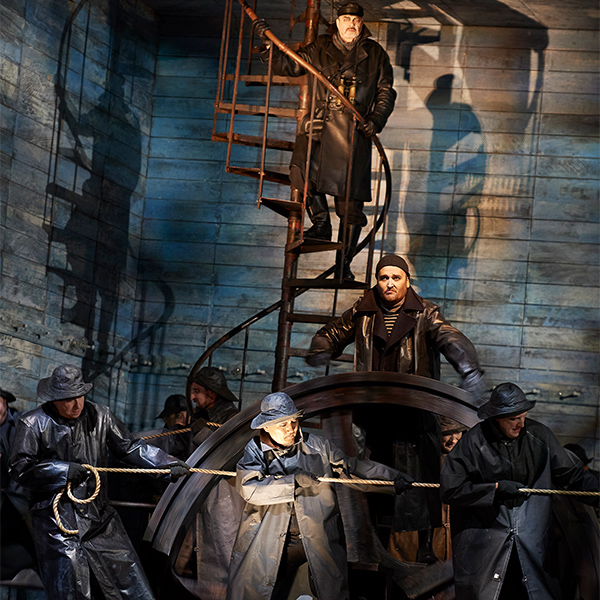August 25, 2023
Enrique Mazzola's season of firsts
A conversation with Music Director Enrique Mazzola, whose 2023/24 Season is full of milestone moments
Enrique Mazzola was in an upbeat mood when we spoke this past summer via a Zoom call between Chicago and Bregenz, Austria, where the Spanish-born, Italian-trained maestro serves as conductor in residence of the Bregenz Festival. Fresh off back-to-back performances of Verdi's Ernani and Puccini's Madama Butterfly at the lakeside opera festival, Mazzola said he was eagerly anticipating his return to Chicago, where he will celebrate his third season as Music Director with a host of career firsts.
The 2023/24 Lyric season opens with the first Wagner opera you will have conducted here, The Flying Dutchman — as well as the first 21st century opera of your Chicago repertoire, Terence Blanchard's Champion. The Requiem will be your first Mozart here. And then you will close the season with your first complete Aida in any opera house.
It's not that I had planned to do a season of firsts. When Anthony Freud and I create an opera season, we try for variety in terms of languages, what's known or unfamiliar, and to include contemporary opera. We try to achieve a continuity with the season that came before and the seasons that follow. Dutchman will be my first German opera at Lyric. Champion will be my first contemporary opera, as COVID prevented us from presenting Missy Mazzoli's Proving Up [in 2020/21]. Although I have conducted many Verdi operas, I have only done concert excerpts from Aida, never a full production. I am pleased to say it will be the 100th opera in my repertoire!
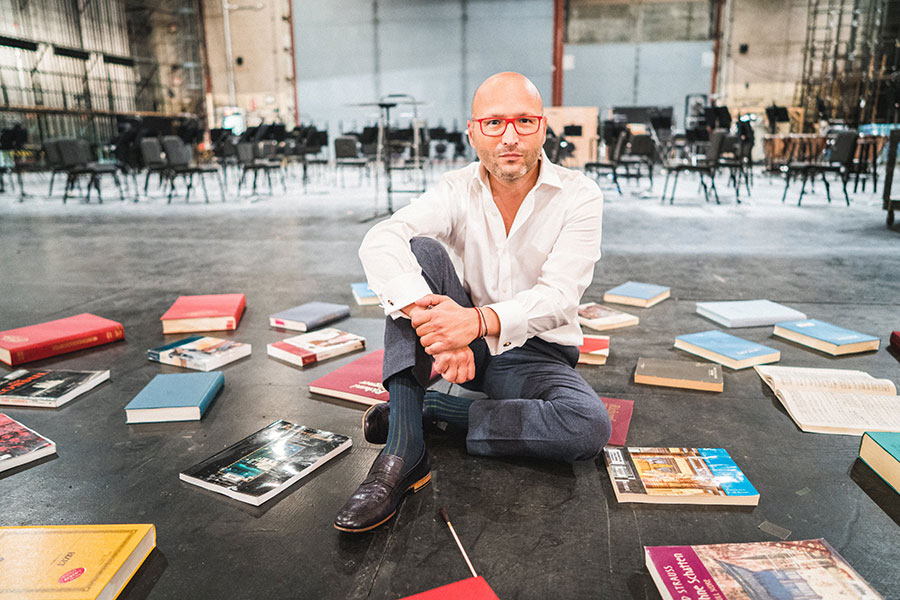
Music Director Enrique Mazzola sits on stage at Lyric Opera of Chicago surrounded by orchestral scores.
Speaking of The Flying Dutchman, what considerations impacted the choice of this early Wagner masterpiece for the current season?
Dutchman was written in 1843; Ernani, which opened our season last year, premiered one year later. The proximity of those premieres excited my imagination. Here we have the youthful Verdi, practically the same age as Wagner. Just as you hear all the energetic, Italianate power of the young Verdi in Ernani, with Dutchman you find the foundation of Wagner's mature musical language. Given that my conducting path has been very structured in terms of periods and chronology, Dutchman is a logical starting point for my journey into German Romantic opera. My journey will continue next season with Carl Maria von Weber's Der Freischütz, in Bregenz. Who knows? In the not-too-distant future I hope to conduct Beethoven's Fidelio and Wagner's Lohengrin — and I want to be ready for that.
What factors make the orchestral sound-world of Dutchman different from the orchestral palette of his later operas?
The orchestration of Dutchman is very rich, compared to, say, Verdi's orchestral accompaniments for Ernani. In fact, it's a score where Wagner gets "super-forte." Orchestral musicians of the mid-19th century did not yet have very powerful instruments at their disposal, and because Wagner was very precise about the kind of sound he wanted, you see many fortes, fortissimos, and fortississimos in scores. His is not only a rich orchestration but also a powerful orchestration.
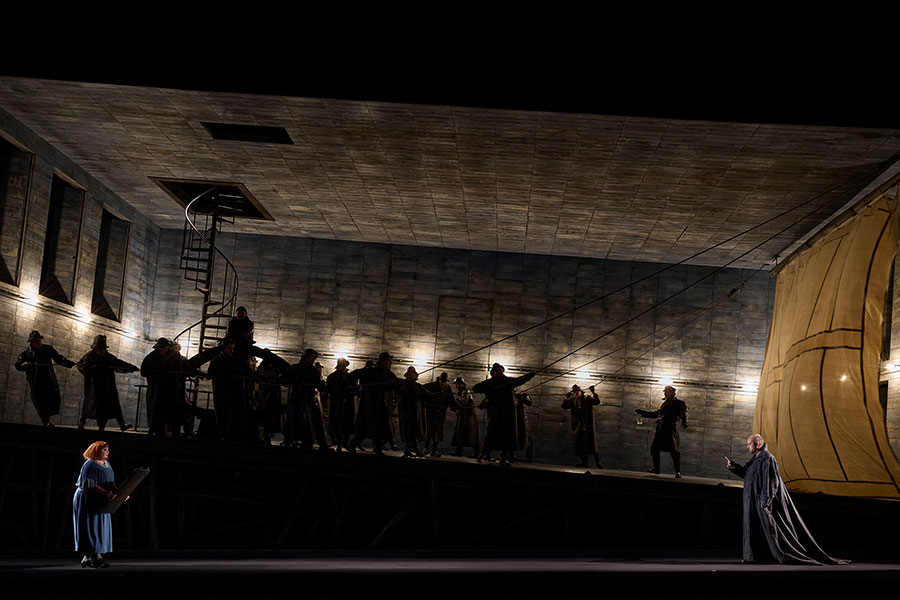
Wagner's The Flying Dutchman returns to Lyric in a ghostly production by director Christopher Alden, inspired by German expressionism.
Lyric audiences were introduced to the operatic Terence Blanchard in 2022 with his second opera, Fire Shut Up in My Bones. In 2024, they will hear the Chicago premiere of his first, Champion. What appeals to you about these works?
Blanchard subtitles his piece "an opera in jazz," rather than a "jazz opera." His way of writing opera, drawing on his deep knowledge of jazz to create a unique musical language that swings between classical and contemporary, in a truly cinematic flow, makes his language at once very interesting and very accessible. It seems that there's great potential for Lyric to expand its audience with Champion. That is so important for me. From the very beginning of my appointment as Music Director, I said that while it is the duty of a major international company to explore the classics of the repertoire, it is no less important to put on stage what we see all about us right now — contemporary opera that tells contemporary stories. New operas can not only be very beautiful and deeply moving, but also can hold up a mirror to 21st century society, in a very powerful way. I firmly believe opera is the most complete, most complex, most challenging art form we have today. If we don't use that art form to reflect on what's going on in the world, what better means is there?
What is your approach to the perennial audience favorite that is Verdi's tuneful spectacle, Aida?
Since this will be my first complete Aida anywhere, I won't be approaching our production as a "repertoire" opera. I'm delving deeply into the score with the "purest eyes," to absorb all the musical and dramatic information Verdi gives us. I hope to conduct this work with the sacro fuoco — the sacred fire — of a first-timer! As with Don Carlos, which I conducted here last season, Verdi conceived the opera on a grand scale. My experience with that opera will help me to enter the very special world of this masterpiece, to balance its elements of intimacy and grandiosity as Verdi intended.
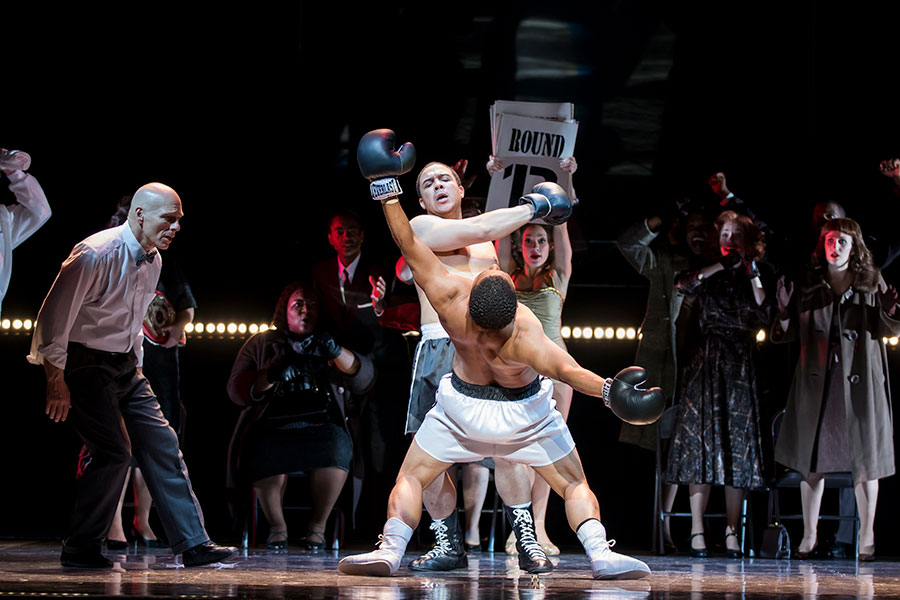
Terence Blanchard's first opera, Champion, is based on the true story of famed welterweight boxer Emile Griffith.
How has your artistic and personal relationship with the members of the Lyric Opera Orchestra evolved since the start of your tenure in 2021?
All artistic relationships between musicians and their music director begin with human sentiments, which are basic for making music; one of the most basic of those sentiments is mutual trust. We work together, and when we set the first note of a performance, we set everything into motion — passionately so, putting together every aspect of the orchestral foundation. Our relationship broadens and deepens with every performance. We are getting to know each other better and better, the musicians and I. Together I think we are achieving a very clear, transparent sound — a sound that allows the orchestra maximum expressivity and, at the same time, creates the maximum range of colors at all dynamics without risking the cohesion of the ensemble.
Last season, I attended some performances conducted by others, and I was very proud to hear the orchestra working in the direction of greater transparency, every sound audible to the audience. I dislike it when clarity and articulation are lost. To make certain that every sound and color register in their proper places, in rehearsal I will ask the orchestra to play pianissimo instead of just piano, staccatissimo instead of just staccato. The entire orchestra is working in that direction, and that makes me very happy. I work with many orchestras around the world, so I can speak with some authority when I say the Lyric Opera Orchestra is one of the best in the world. That is not the vanity of a music director speaking! I'm deeply proud of our orchestra — and of our Lyric Opera Chorus as well.
During the Aida run in the spring, audiences will hear two performances of the Mozart Requiem, a choral masterwork Lyric has never done before, paired with Mozart’s rarely heard incidental music to the play Thamos, King of Egypt. How were these works chosen?
Besides being the very first Mozart I will have conducted at Lyric, I thought it would be a good idea to give our splendid chorus a very beautiful showcase. The Requiem is a fantastic choral piece, and I’m looking forward to having our orchestra and chorus onstage to perform it. Mozart’s unfinished setting is his final testament, a thoughtful reflection on the deepest meaning of the Latin mass for the dead. We will employ a compact-sized orchestra that will allow us to enter a different sound-world from what our audiences are used to hearing in opera.
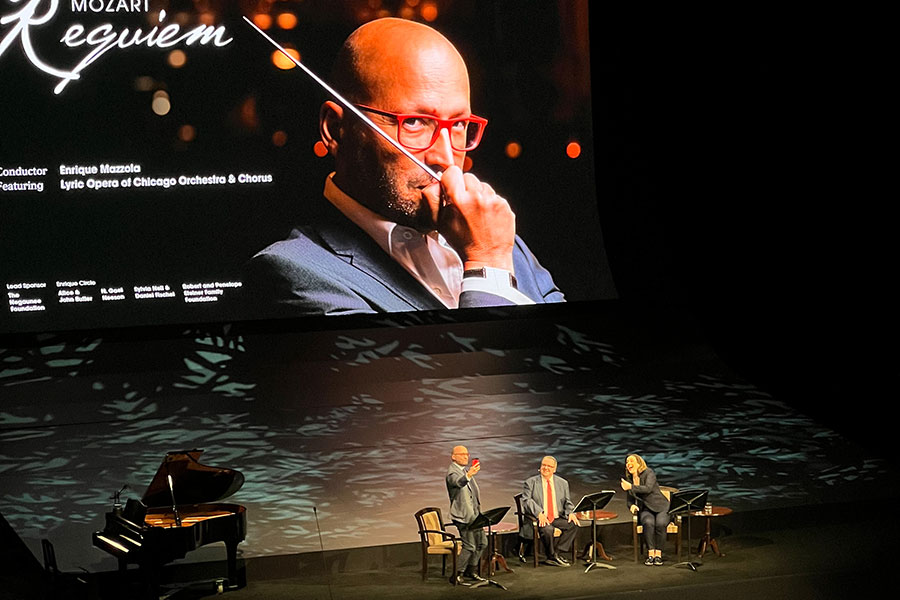
Enrique Mazzola, onstage with General Director Anthony Freud and host Andrea Darlas, captures a self portrait at Lyric's 2023/24 Season Preview event.
Three conductors are appearing at Lyric Opera for the first time in 2023/24 — Speranza Scappucci leading The Daughter of the Regiment, Jakub Hrůša pacing Jenůfa, and Yi-Chen Lin conducting Rossini's Cinderella. Three podium debuts in a single season is rare, if not unprecedented.
It is a happy coincidence — I can assure you we did not plan it that way! Every season presents opportunities for us to invite important young conductors who have enjoyed success outside Chicago to lead performances with our opera company. I'm actually super-proud of these three. Jakub Hrůša and Speranza Scappucci will assume their positions as music director and principal guest conductor, respectively, at the Royal Opera House, Covent Garden, beginning with the 2025/26 season. Yi-Chen Lin, another prominent young conductor, shared performances of Ernani and Butterfly with me in Bregenz.
Clearly you conceive your position at Lyric as that of a full-service Music Director in a very real sense — an active link between the opera company and the community.
I consider the role of the music director not only to be the principal conductor, but also as someone who can work with everyone in the opera company. To be an ambassador for the vision of the company and its mission within the civic and cultural life of the city. Last year, Chicago's Merit School of Music invited me to work with its student musicians on a fantastic project. I saw the future of music in their diversity, and in the talent and enthusiasm that shone in their eyes. The experience filled me with hope.

